Table of contents:
People who consume opioids are at risk of developing addiction. Personal history and the amount of time an individual uses opioids plays a significant role in how they begin to suffer from addiction. However, it's impossible to predict who is more vulnerable to this addiction and who isn’t. It’s also a fact that these drugs are responsible for most overdose deaths worldwide.
This article will cover what opioid addiction is and how to best treat it, along with the types of opiates that are used around the world.

Opioid Side Effects on the Brain and Body
In some cases, a person might try to breathe slowly but cannot get enough oxygen. In severe overdoses, a person may stop breathing entirely, triggering serious brain damage. A person will have a range of Opioid side effects, depending on the oxygen-deprived area of the brain:
The body suffers similar side effects of opioids, including:
Lesser known side effects include:
Symptoms and Signs of Opioid Addiction
Many symptoms and signs indicate that a person is struggling with an opioid addiction. Long-term opiate dependence can lead to irreversible damage to the brain and body. Some of the opioid addiction symptoms include:
Psychological signs:
Physical symptoms:
Types of Opiates
Opioids can serve as pain reliefs, and in the past were often prescribed to patients with more severe health complications. After the increased risks of opiate abuse and developing addictions, doctors have become more careful. They are taking measures to ensure that the patients don’t become dependent on the drug and keep them under observation if they are taking any opioids. Some of the types of opioids include:
Tramadol
Tramadol operates in the brain to alter how your body reacts and feels pain. Doctors will prescribe Tramadol extended-release tablets or capsules to individuals who need painkillers around the clock.
Heroin
Heroin is made from morphine, a real substance extracted from the seed pod of different opium poppy plants. These plants usually grow in Southwest Asia, Southeast Colombia, and Mexico. Heroin is usually a white or brown powder, but it can also be a dark sticky material known as black tar.
Methadone
Methadone’s effects progress slower than other painkillers, i.e., morphine. A doctor might prescribe methadone if the patient has severe pain due to a surgery, injury, or some long-term disease. It also prevents the highs from drugs like heroin, morphine, codeine, and hydrocodone, which is why it’s a form of alternate opiate addiction treatment. However, it's a treatment, not a cure.
Morphine
Morphine is a pain-alleviating drug used for patients dealing with intolerable pain, and belongs to a group of drugs called opioid analgesics. It affects the brain to change how it reacts and responds to pain. Since some people become addicted to that numbing feeling, it becomes grounds for a dangerous Opioid drug addiction.
Subutex
Subutex helps stop withdrawal symptoms caused by opioid addiction. It’s a part of a complete treatment program for drug abuse (such as counseling, monitoring, behavioral contract, and lifestyle changes).
Suboxone
Suboxone is a medicine used for treating people addicted to opioids. It contains vital ingredients, such as Buprenorphine and Naloxone. Together, they both function to prevent withdrawal symptoms often associated with an opioid addiction.
Treatment Methods for Opiate Addiction
The treatment methods for opiate addiction include:
Medication-assisted treatment for Opiate Addiction
(MAT) Medication-assisted treatment is the use of medicines combined with counseling and behavioral therapies. Better known as holistic treatment for opiate addiction, it has proven effective and can help some people recover better from their addiction.
Alternative Treatment for Opiate Addiction
There are some alternative opioid treatment options:
Inpatient Treatment vs. Outpatient Treatment for Opiate Addiction
Patients can receive the following treatments based on their opiate addiction.
Inpatient Opioid Treatment
It's important to prepare for rehab, since there's no definitive amount of time to prepare for treatment. It is vital to set an entry date for rehab and to settle your affairs before that.
Outpatient Opioid Treatment
An outpatient drug program is less restrictive than inpatient rehab. Outpatient recovery programs usually have 10 to 12 hours a week to spend visiting a local treatment center.
Opiate Addiction Treatment at Home
Opiate Addiction Treatment at home is challenging, but it can be possible with a proper support system, and over-the-counter medication can help ease symptoms.
Stages of Opiate Addiction Treatment in VipVorobjev Clinic
At VipVorobjev, we help you with opiate addiction throughout your journey from diagnosis to complete recovery:
Effectiveness of treatment for Opiate Addiction
While effectiveness of treatment programs can fluctuate due to many reasons, research has shown that treatment programs are effective and that recovery is an achievable outcome.
Addiction takes willpower and fierce determination to overcome. A lot of individuals recovering from addiction have found tremendous help and increased sense of accountability because of support groups or individual counseling to stay on a drug-free path. Although treatments last only a few weeks or months, the commitment to being sober lasts a lifetime.
Cost of Opiate Addiction Treatment
Opiate addiction treatment is usually part of a health insurance plan. However, the level of coverage fluctuates depending on various factors, such as, the type of health insurance policy, treatment provider, behavioral health benefits, etc.
Doctors
Treatment for Opioid addiction requires help from medical experts. The doctors we have are experienced professionals. We value their hard work and hope you will too. You can rely on their expertise to help you handle your opiate addiction.
Patents and Certificates
Evidence is everything in medicine. We have the proper qualifications and knowledge to support your claims. It’s our goal to continually seek and study new strategies to treat addictions.

